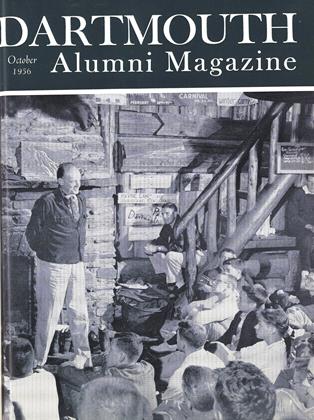IN Peyton Place, Grace Metalious, as the dustwrapper says, lifts the lid off a small New England town. Incidentally this town is not too far from White River Junction, but it is well disguised, and is a composite of many small towns in the New England hinterland. This novel is a far cry from the manner and style of the "lavendar and old lace" school, and yet I found little or nothing in the story to shock me, or to shake my head as if to say, "This simply isn't so." As a matter of fact it is very much so, as readers of any smalltown paper know. The technique deI'amour in the more rustic centers is realistically described but never does the de- scription become pornography. It is as if Erskine Caldwell or William Faulkner tried to write a local Tess of the D'Urbervilles. This is, as Chief Spoon-in-the-Haggis says, strong medicine.
I give my own personal "Wah-Hoo-Wah" to Courtney Anderson '31 who has, in his To the Golden Shore: The Life ofAdoniram Judson, written a major Amer- ican biography; one, that Dartmouth men may all be proud of. I happen to know that it took a lot of sweating and some personal sacrifice to finish this monumental book. As it is to be reviewed in these pages by a man better qualified than I, I will only say that I hope you will buy this book and read the fascinating life of an early New England missionary to Burma. Congratula- tions, Court, and may you receive the Pulitzer Prize in biography.
One of the real pros today in writing is the Englishman, Robert Graves. Last June his Collected Poems, 1955 was published by Doubleday and they soon followed with a collection of Graves' essays on poetry called The Crowning Privilege. I have had a great admiration for Graves ever since I read his Good-Bye to All That back in 1929. He writes on Biblical criticism, Greek mythology, and army folk lore with equal ease. But in his critical essays on poetry he is really at his best. I think his opinions, though radical, are certainly stimulating, and perhaps not too far from what posterity will come to believe. He is, perhaps, a little too harsh on Milton, and is not over-kindly to Pound, Eliot, or the current hero of the avant-garde, Dylan Thomas. Read him "for kicks" if nothing else, but I think you will find yourself enjoying his thinking and the professional quality of his writing.
If you are, or want to become, a vicepresident or executive secretary, you might profit from reading The Executive Life, written by the editors of Fortune and published by Doubleday. Especially should the wives of executives read this. It might help prolong the days of ulcers, or a palpitation of the diaphragm. Such questions as "how executives crack up," "how to treat vice presidents," etc., are fully discussed in the crisp, IBM manner of the editors of Fortune. This is a welcome relief from Dale Carnegie and the saintly Mr. Peale.
The Mainstream of America Series continues to maintain its high standards in C. S. Forester's The Age of Fighting Sail:The Story of the Naval War of 1812. This war, which the New England Federalists did not want, still appears as folly today. However, there were several glorious victories and the descriptions of the fighting are superbly done by this talented writer of the sea.
Two of Alfred A. Knopf's novels I enjoyed recently are Goffredo Parise's DonGastone and the Ladies, an amusing and sympathetic study of "the impoverished suburbs of Venice," and Jules Roy's story of a flyer, The Navigator. I missed these last year but am glad I caught up with them. From a vastly superior vintage.
Abner Dean '31 sent me his Not Farfrom the Jungle, an amusing and clever satire on the human race. The World Publishing Company of Cleveland is the fortunate publisher.
Kim Flaccus '33 sent me a volume devoted to a critical appreciation of Adam Mickiewicz, 1708-1855. One of Kim's poems shared the glory with Auden, Miss Bogan, Robert Hillyer, and others.
I must spend the rest of the space acquainting you with some excellent paperbacks published by Anchor Books. For the Catholic reader there are excellent editions of Francis X. Talbot's stirring story of Jean de Brébeuf: Saint Among the Hurons; the Apologia pro vita sua, of John Henry Newman, Cardinal of the Church; and Hilaire Belloc's classic The Path toRome. I do not mean to appear biased: these books will delight any intelligent reader. So, too, Charles M. Doughty's Travels in Arabia Deserta and Roger Fry's Transformations (art essays).
 View Full Issue
View Full Issue
More From This Issue
-
 Feature
FeatureBusiness as a Social Service
October 1956 By THE HON. RALPH E. FLANDERS, LL.D. '51, U.S. SENATOR FROM VERMONT -
 Feature
FeatureIndustry Galls On the Liberal Arts
October 1956 -
 Feature
FeatureHE DUG DEEP TOO
October 1956 -
 Feature
Feature1960: Big, Bright, Lots of Them
October 1956 -
 Feature
Feature"Dartmouth Visited"
October 1956 By ROBERT L. ALLEN '45 -
 Class Notes
Class Notes1918
October 1956 By ERNEST H. EARLEY, W. CURTIS GLOVER, RICHARD P. WHITE
HERBERT F. WEST '22
-
 Article
ArticleHANOVER BROWSING
November 1935 By Herbert F. West '22 -
 Article
ArticleHanover Browsing
March 1931 By HERBERT F. WEST '22 -
 Article
ArticleHanover Browsing
October 1941 By HERBERT F. WEST '22 -
 Books
BooksTHE AMAZING JOURNEY OF DAVID INGRAM
December 1949 By Herbert F. West '22 -
 Books
BooksTHE BLACK LILY
July 1951 By Herbert F. West '22 -
 Article
ArticleHanover Browsing
June 1958 By HERBERT F. WEST '22







